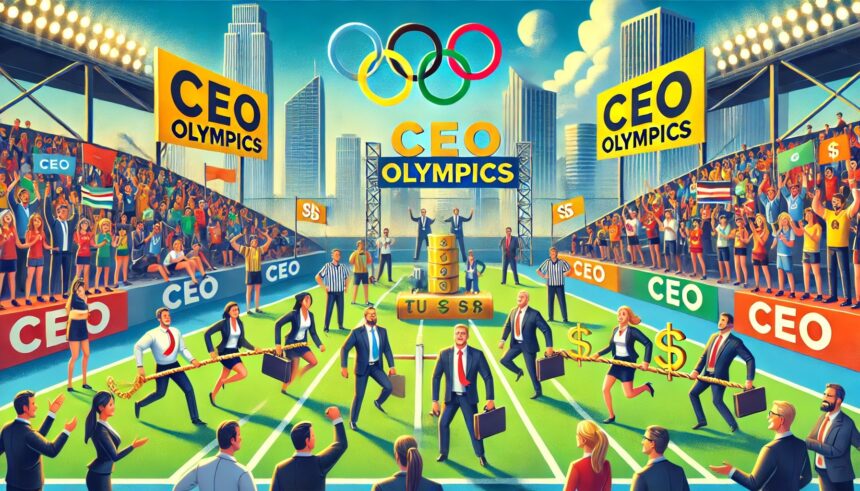It is a common misconception that competitive markets produce efficient outcomes. competition Competition can increase effort, but that effort does not necessarily have to be directed toward something productive. Increased competition also has a dark side, in that it tends to create unnecessary duplication of effort and waste. The idea that competition can be problematic rather than efficient is sometimes associated today with investors. Peter ThielBut in reality, this view is nothing new: in fact, the idea that competition is wasteful is a revival of criticism made by economists more than a century ago.
Thorstein Veblen Claimed In 1899, Veblen concluded that competition is driven by basic human instincts such as “ferocity and cunning.” For Veblen, “modern competition is primarily a process of self-assertion based on the predatory traits of human nature.” Predatory traits may benefit the individual who wins the competition, but they do not directly promote the interest of the community as a whole. Veblen saw competitiveness as arising from a fear of loss of self-respect if one fails to excel in society’s valued endeavors. Competition is therefore driven primarily by a desire for respect from one’s peers.
Joseph Schumpeter Also I have written In 1942 he stated that “Contrary to textbook portrayals, in the reality of capitalism it is not (price) competition that matters, but competition with new goods, new technologies, new sources of supply, and new types of organization.” In other words, what is important for economic development is not competition along narrow dimensions such as price or number of firms, but rather the abundance of different organizational structures, products, and innovations that should be the focus of attention.
Veblen’s view may be close to what you think of when you hear the phrase “futile competition.” Imagine two roughly equally competent executives competing for promotion to CEO of the same company. They spend a great deal of time and effort trying to outdo each other, even though realistically only one can get the job. In a sense, in this winner-take-all scenario, all the efforts of the losing candidate have been wasted. Promotion competition among employees is much like a company lobbying for government favors in a zero-sum game. One could argue that the person who came second would have been better off applying their talents elsewhere, in a more specialized role that creates new value.
As FA Hayek The competition isDiscovery Procedure” is necessary to uncover knowledge about the best candidates, products, and business models. But his claim may be overstated. The key to unlocking knowledge about the best methods and candidates may simply be experimentation and diversity of approach, rather than multiple companies and employees copying each other’s strategies in a competitive market. Thus, differentiation and specialization may produce a “discovery procedure” that is as good as, or even better than, the competition.
Anecdotally, I’ve found that my best work comes from focusing on less-popular topics where demand is high but supply is low because there is little competition. For example, I’ve had success studying the topic of regulatory reform in US states. By working on such a niche issue, Comparative advantage It’s simply a matter of the division of labor: if there were many competitors working on these problems, I doubt that my work would have been as visible or as effective.
A hypothetical perfectly efficient economy would be characterized by “perfect specialization,” with each individual and each firm monopolizing a unique role. Competition still has a role to play in stimulating efforts to overcome lethargy, but this role may not be as important as students read about in economics textbooks. Competition is totally inefficient if it encourages downsizing at the expense of creating unique added value for oneself or one’s firm. From this perspective, Exclusive This isn’t as much of an issue if it’s built on true uniqueness rather than barriers to entry.
Another source of unnecessary competition is the academic race to get into elite universities. Students compete in extracurricular activities such as SAT preparation, sports, and club memberships. But when taken to the extreme, this can lead to Unproductive signaling games Prove you have overcome more hurdles than the next applicant. Again, some level of competition is healthy for motivating and revealing talent. But the competitive process can quickly reach a point of diminishing returns if students pursue activities that pad their resumes rather than true value creation and human capital development.
In general, competition serves a legitimate purpose when it motivates people to be productive who would not otherwise do so spontaneously. But it would be better if people pursued excellence because they wanted to, not because they had to. In an ideally efficient economy, everyone would be endowed with “perfect tastes” and would become a spontaneous monopoly, driven by their drive to create value for others. As Schumpeter hoped, competition would be one of the best ideas, not the most cutthroat tactic.
In conclusion, economists should not treat competition as a pure good. They should take seriously the possibility that competition creates waste and that zero-sum competition for status limits output and innovation, rather than the other way around. A combination of minimal competition that encourages effort, strong intrinsic motivation, and high levels of specialization and experimentation may be best. In other words, a world in which there is intense competition at every turn has significant disadvantages compared to a world in which people are each focused on excelling in their own way.
James Broegel is a senior research fellow at the Competitive Enterprise Institute, where he focuses on innovation and dynamism.







